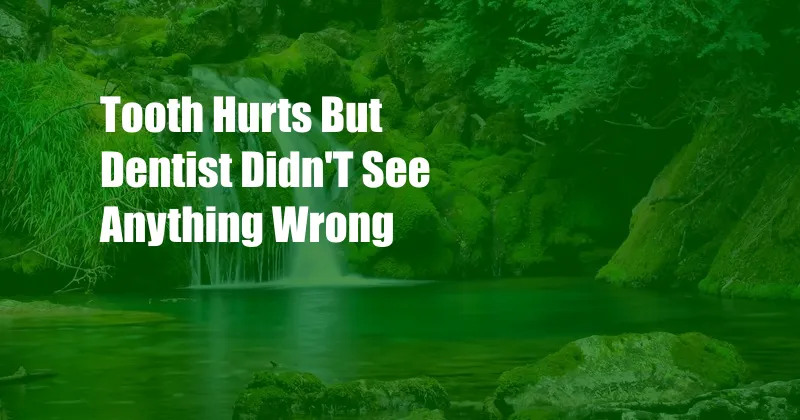
Tooth Hurts But Dentist Didn’t See Anything Wrong: A Comprehensive Guide
Have you ever experienced a nagging toothache that persisted despite a visit to the dentist who couldn’t find anything wrong? This frustrating scenario can leave you wondering what’s causing the pain and how to find relief. Read on for a comprehensive guide to why your tooth may be hurting even though the dentist didn’t see anything wrong, including tips and expert advice.
Imagine this: you’ve been suffering from a persistent toothache for days. Desperate for relief, you visit your dentist, only to be told that everything looks fine. You leave the appointment disappointed and still in pain. If this sounds familiar, you’re not alone. Many people experience tooth pain that doesn’t seem to have an obvious cause.
What Could Be Causing the Pain?
There are several potential causes for tooth pain that may not be visible to the dentist during an exam. These include:
- Dental Abscess: An abscess is a pocket of pus that forms in the tooth or gums due to bacterial infection. It can cause severe pain, swelling, and sensitivity to hot and cold.
- Cracked or Fractured Tooth: A tiny crack or fracture in the tooth may not be visible on an X-ray. These cracks can cause pain when you bite down or apply pressure.
- Temporomandibular Joint (TMJ) Dysfunction: TMJ is the joint that connects the jaw to the skull. Dysfunction of this joint can lead to pain in the jaw, face, and ears.
- Sinus Infection: Sinus infections can sometimes cause pain in the upper teeth. This is because the sinuses are located close to the tooth roots.
- Gum Disease: Advanced gum disease can cause pain in the gums and teeth, as well as bleeding and swelling.
Tips and Expert Advice for Finding Relief
While it’s important to see your dentist to rule out any serious underlying issues, there are several things you can do at home to find relief from tooth pain:
- Over-the-Counter Painkillers: Ibuprofen or acetaminophen can help reduce pain and inflammation.
- Cold Compress: Applying a cold compress to the outside of your cheek can help reduce swelling and pain.
- Salt Water Rinse: Rinsing your mouth with warm salt water can help kill bacteria and reduce inflammation.
- Avoid Hard or Chewy Foods: Until the pain subsides, stick to soft foods that don’t require much chewing.
- See a Specialist: If home remedies don’t provide relief or the pain persists, consider seeing an endodontist (root canal specialist) or an oral surgeon for further evaluation.
Frequently Asked Questions
Q: Why didn’t the dentist see anything wrong with my tooth?
A: Dental issues like abscesses and cracks may not be visible during a standard exam. X-rays or other diagnostic tests may be needed to detect these problems.
Q: What should I do if my tooth is still hurting after seeing the dentist?
A: Contact your dentist again to discuss the persistent pain. They may need to perform additional tests or refer you to a specialist for further evaluation.
Q: Can I ignore tooth pain if the dentist didn’t find anything?
A: No, ignoring tooth pain can lead to serious consequences, such as infection or tooth loss. It’s important to seek professional advice and treatment.
Conclusion
Tooth pain can be frustrating, especially when the dentist can’t find anything wrong. However, understanding the potential causes and following the tips provided can help you find relief. Remember, it’s important to seek professional advice if the pain persists or worsens. By taking proactive steps, you can manage your toothache and improve your oral health.
Are you interested in learning more about preventing and treating tooth pain? Share your experiences or ask additional questions in the comments section below.